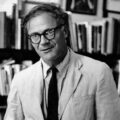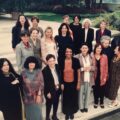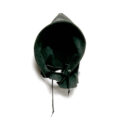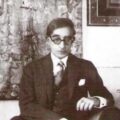Aaron Shurin’s Citizen
Citizen marks Aaron Shurin’s return to the prose poem after fifteen years. His previous verse collection, Involuntary Lyrics, was a re-warping of the woof (as Robert Duncan would put it) found in end words of Shakespeare’s sonnets. Between these, Shurin took a turn towards memoir with the collection King of Shadows. San Francisco serves as the predominant setting for many of Shurin’s prose sketches in that collection, as it does in Citizen. This is no surprise. Shurin has lived in the city since 1974, and in many ways his life is inextricably woven into that of the area as a whole, as his poem “City of Men” and Unbound: A Book of Aids indicate. Like Robert Duncan, one of his assured mentors, Shurin is a poet of place, and Citizen reflects the attendant responsibilities such a relationship entails.
For Shurin, as for Duncan, the city itself is powerful presence in the imagination, a partner with whom he lives and writes in a balanced, dynamic exchange of fruitful explicative:
For this city is a threshold in play, with its excavated courtyards layered by shade, its alleys of lost stratagems and scuttling students charmed by digressions, its pastel stacks and glistening facet high on the hill that is my blue box that is my citadel unearthed each morning that is my fugitive reconstruction, elevated, breathless again — totemic vision — on this incline in the clamorous hive. . . (“The Abundance”)
Shurin knows the form of the prose poem well. Here, his adept lyricism within it hits heights others haven’t often reached for. Shurin is a poet of the sexual, though he never backs away from embracing the demands made by the poem, wherever they may lead:
Let the knotted grid loosen, let your hard silhouette overflow — alluvial redemption: let me slink away soundlessly into the lavender hills — sanctuary caravan — cowboy, don’t eat me, go for the calf over there, tender as cactus jelly. I’m too sweet and too fat, my innards are frescoes of hormone spikes and acid splats — mucho digestive scrabble (“Cowboy, Don’t . . .”)
His writing folds the mundane and the mythic in with deep images of personal archetype. The passing moments in which the poems possessed Shurin are held fresh to the page in a dazzled string of trigger-touches. They hint of lingering spiral passages, personal journeys, which lie just below such occasions. It is clear that Shurin lives a life of the imagination, transforming moments from his daily activities into poetry’s eternal realm:
He is whirling like a haystack, engineered in twilight, his syllables aquatic, lullaby stutter. Scale of my scale, raveling hive. A skate-boarder rocks the concrete, cutting the muscle of silence. You, too, seeping memories, as we spin in place. An epiphyte: a love nest. Inextricable, shadow for shadow, rhyme for rhyme. (“Steeped”)
The hive is a reoccurring image, and what is a hive but a bustling community of energy like a city. It is this continuous swarming of bodies and buzzing communication that Shurin’s poems step into. Paul de Man writes of Keats, “poetry is essentially an act of sympathy, of human redemption;” Shurin’s poems continually place him in new relations to those around him, taking part in the formation of the ongoing history of his community:
Across the wide rim of the Bay — cirrus — hissed equanimity — the glasscutter’s cascade — where he will pause to locate himself on a map of monarchs and queens — in the city’s periodic swirl that leaves him lolling on wobbly knees — across the lumpy pavement and rain gullies just filled — from café to bookstore to hill-park (“Citizen”)
Shurin enacts, as de Man also writes, “a necessary first step toward the full unfolding of humanitarian love as it grows into a deeper understanding of the burden of mortality.” This quality, which de Man terms a “necessary first step,” is renewed with each generation of poets. It forms the primal basis for what makes poetry humane and necessary. Shurin’s awareness of both the sacrifice and the risk entailed in poetry that openly pursues such an ideal is prominent. He writes with the concern of a participating member of an urban environment committed to being present, accounted, and accountable:
across that flipped metropolis on its back ventral skin laid bare to him — where he will follow his newly stumbling gait as if running behind himself as he once was in high cram of simultaneous days — twister — which he has been, and longed for, and stampeded into, duly imagined, communalized, extracted from, recollected, remade, revisited, abided by, grown into and old in and smart and stayed fresh for (“Citizen”)
Shurin’s ear is fine-tuned to hear the literary in the colloquial as well as the colloquial in the literary. This is apparent in the great linguistic heft of each line, which, despite their erudition and lyricism, does not hinder the poem’s effortless flow.
The delight with which Shurin teases his own proclivity for enriching every reference with sonorousness is a pleasure. These poems risk self-mockery, yet managing simultaneously soaring declarations filled with earnest beauty: “Really on a broomstick after quarry, like a poet drunk on vowels . . . thrashing among the tousled clouds . . .” He matches his wit with a verbal punchiness as he enjoys the role he’s allowed to play:
. . . scrawled through the swiveling canyon such astounded names as mythic plagues are drawn from . . . curated then for me a further spectacle cupped by my glass door watching and listening pure unrestrainable excess . . . invincible roar . . . inhaling me . . . of the little serenade, the miniature stance, the tiny thunderstruck eyes . . . (“Proportional”)
Energetic as a newborn pug, Shurin allows this proclivity to have free reign — up to a point. He’s disciplined and experienced enough to recognize, and be appropriately wary of, areas where over-doing it cautions against further verbosity. Never one to play fast and loose, Shurin is his own best controller. He recognizes the direction which suits his skills best, and hones his work accordingly, no fool for how others might read him:
They mistook me for illumination — a revenant in walking shoes — so I gathered significance and spread text . . . stood beneath the seven cardinal points with arms upraised — practical telepathy — in a white paper suit like a flag of surrender, thunder at my back . . . I was an open man of the open streets — a burnished sieve of common purpose — scrawled on walls, thrashed cans and blasted caps for equivalence.
Shurin is speaking as much for the poem, as the poem, as for himself. As a student, Shurin studied with Denise Levertov in Berkeley and, later, was the first graduate of Poetics at New College of California under Robert Duncan’s tutelary guidance. His work emerges as one leg of a continuing presence of the Charles Olson/Robert Creeley “Black Mountain” poets, usefully bringing its poetics into the current day. He continues:
I wasn’t alone — the boulevards teemed with wiggly kids and mooning parents slow as boulders. In the Plaza Palabara on a green iron bench a grand senora suffered the odes of schoolboys and thugs — smiled behind an opal fan while they searched for words to match their tumultuous nights — and all words fit . . . (“The Practice”)
Emerging from within a larger community of poetry, Citizen serves as testimonial to Shurin’s interests while responding to past and ongoing work. This is achieved by a commitment to the living force of the shared imagination. In this sort of affair, Shurin knows that nothing is to be ignored, at the peril of failing one’s responsibility as fellow and co-participant. Behind poetry of this order lies the recognition that the poet is sitting at a table with others, the company that Robert Creeley speaks of, companionship by way of rite, as Robert Duncan’s work recognizes.
In this way the writing turns, in the best sense, upon its surroundings. The call and response of texts, as well as events, and of the city, multiplies as one’s reading extends alongside one’s living: the occasion of poetry being, above all, that of the lived moment. Such are the demands of this art, which requires a manifestly skilled exertion of talented verve. Shurin’s book is a declaration of his place among this order of poets.
About Patrick Dunagan
Patrick James Dunagan lives in San Francisco and works in Gleeson library at USF. His latest book is There Are People Who Think That Painter's Shouldn't Talk: A GUSTONBOOK (Post Apollo, 2011). Other writings appear (or expected) in 1913, A Journal of Forms, Amerarcana, Greetings, House Organ, Lightning'd Press House Mag, and elsewhere.






